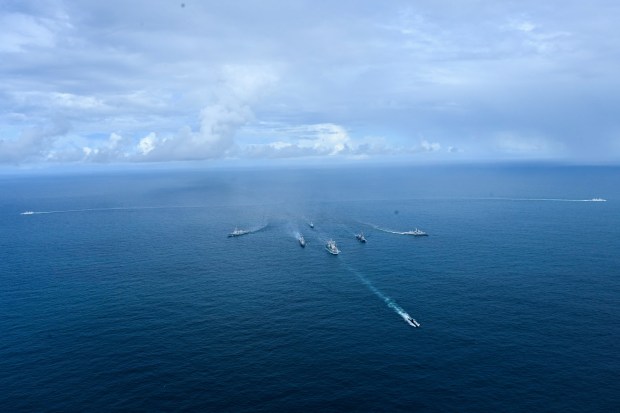The closing ceremony of Malabar 2024, held on 18 October in Visakhapatnam, marked the conclusion of another significant chapter in the growing maritime collaboration between the Quad nations—India, the United States, Japan, and Australia. What began as a bilateral effort between India and the US has evolved into a crucial platform for naval coordination and security cooperation in the Indo-Pacific, a region that has become increasingly critical in the global geopolitical landscape.
This year’s exercise not only highlighted the increasing complexity of naval operations but also underscored the commitment of all participating nations towards ensuring regional stability through enhanced collaboration.
A Show of Strength in the Sea Phase
The sea phase of Malabar 2024, held off the coast of Visakhapatnam, served as a testament to the operational capabilities of the Quad navies.
A diverse array of warships, submarines, helicopters, and long-range maritime patrol aircraft from the four nations participated in a series of advanced exercises across surface, sub-surface, and air warfare domains.
Key highlights of the sea phase included surface weapon firings, anti-air and air defence drills, and anti-submarine warfare exercises, all conducted with a high level of coordination and interoperability. The operational tempo was kept high, with shipborne helicopters undertaking various missions alongside seamanship evolutions such as at-sea refuelling from tankers. Maritime interdiction operations, critical to maintaining security in key sea lanes, were also practised, reinforcing the Quad’s commitment to upholding freedom of navigation in the Indo-Pacific.

The involvement of advanced maritime patrol aircraft and submarines underscored the growing importance of underwater surveillance and anti-submarine warfare, as maritime security threats continue to evolve. These exercises not only honed the tactical proficiencies of the Quad navies but also demonstrated their collective capability to address increasingly complex maritime challenges, particularly in light of China’s growing presence in the region.
Strengthening Maritime Security Cooperation
Malabar 2024 once again highlighted how the Quad nations are steadily enhancing their maritime security cooperation through incremental yet impactful engagements. Although the exercise is primarily focused on military preparedness, its broader objectives lie in fostering mutual understanding, operational synergy, and the exchange of best practices among the four navies. This year’s iteration also underlined the growing importance of maritime security in the Quad’s strategic framework, particularly as regional dynamics continue to be shaped by China’s assertive actions in the South China Sea and beyond.
The closing ceremony offered an opportunity for the participating nations to reflect on the operational success of the sea phase. A comprehensive review of the exercises was conducted, with all participants exchanging views on best practices and sharing their experiences. This collaborative review further strengthened the ties between the navies, laying the foundation for continuous improvement in future Quad operations.
Looking Ahead: The Future of Malabar and Quad Cooperation
As the closing ceremony drew to a close, the significance of Malabar 2024 in shaping the future of Quad cooperation became clear. This year’s exercises, which were more complex and technologically advanced than previous editions, reflect the Quad’s concerted response to the multifaceted maritime security challenges that the region faces. With each edition of Malabar, the four nations move closer towards achieving seamless operational interoperability—a critical factor in ensuring long-term regional security.
The importance of Malabar extends beyond its immediate military objectives. The exercise also serves as a strong signal of the Quad’s shared commitment to upholding the principles of freedom of navigation and adherence to international maritime law, particularly in an era marked by grey-zone tactics and territorial disputes. India, with its SAGAR (Security and Growth for All in the Region) initiative, plays a central role in these efforts, using Malabar as a platform to project its leadership in fostering a secure and open Indo-Pacific.
Malabar 2024 also highlighted the Quad’s strategic foresight in preparing for future security scenarios. The exercises, especially those focused on anti-submarine warfare and air defence, demonstrated the group’s forward-looking approach to countering emerging threats. The involvement of submarines and advanced aerial assets highlighted the Quad’s emphasis on real-time maritime domain awareness, a vital capability in an era where geopolitics and technology increasingly intersect.
A Continued Commitment to Regional Security
The conclusion of Malabar 2024 brings this year’s exercise to an end, but the Quad’s broader mission continues. As the Indo-Pacific faces increasingly complex maritime security challenges, the naval cooperation showcased during Malabar will serve as a blueprint for future engagements. The Quad’s commitment to collective security, grounded in high-level coordination and shared objectives, remains a cornerstone in the ongoing effort to maintain a rules-based order in the region.
For the Indian Navy, Malabar remains a crucial element of its evolving maritime strategy. With each passing year, India’s naval leadership within the Quad strengthens, reflecting the nation’s broader ambition of not only securing its own territorial waters but also contributing to the security of the entire region. As the four nations conclude another successful edition of Malabar, their message is clear: through collaboration, resilience, and operational excellence, they are committed to ensuring peace and stability across the Indo-Pacific.
This year’s Malabar exercises have not only reaffirmed the Quad’s dedication to regional security but also highlighted India’s growing role in shaping the strategic landscape of the Indo-Pacific. As the world navigates an increasingly complex maritime security environment, the collaboration seen during Malabar 2024 will be critical in defining the future of Quad cooperation.

